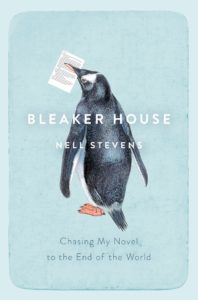HYPERTEXT MAGAZINE ASKED NELL STEVENS, AUTHOR OF BLEAKER HOUSE: CHASING MY NOVEL TO THE END OF THE WORLD, “WHAT QUESTION DO YOU WISH YOU’D BEEN ASKED ABOUT YOUR WORK?”
People who have read my memoir, Bleaker House, wonder if I would ever go back to Bleaker Island, or whether I wish I’d chosen to go somewhere else to try and write my novel. They ask why the hell I wasn’t organized enough to bring more food with me, and whether I really did just happen to have the film Eat, Pray, Love on my laptop, and nothing else. They ask which bits in the fiction are true, and which bits in the memoir are fiction.
So far, though, what strikes me is that most people need to ask me fewer questions than they did before. When I meet someone who has read my book, they no longer need to ask where I’m from, where I went to school, how I feel about this thing or that thing, my relationship status; they already know the answers.
The question I wish I’d been asked hones in on the weirdness of having thrown a piece of yourself out into the world: What does it feel like, as someone who always wanted to be a novelist, to have published a memoir instead?
It seems strange to say, but in many ways, I am naturally a private person. I don’t have a burning desire to open up to strangers. I deleted my Facebook account long ago and am only gradually getting to grips with Twitter. And yet, I have written a book that delves into my emotions, relationships, friendships and fears, and presents them on the page for other people to consider. Not only have I sent my work into the world to be judged, I’ve sent my experiences, my decisions, and my personality along with it.
Sometimes I wish I could have slapped the label “fiction” on the cover and left it at that. If I could pretend the whole thing is made up, then nobody could criticize me, they could only criticize my writing. The idea seems safe, comforting. But it’s also dishonest, too easy a fix. Bleaker House is about exploring the space between fiction and memoir. In combining the two genres, it asks questions about the way life can be shaped into words, the way true experiences wriggle their way into fiction and, conversely, the way that memoir inevitably distorts life in order to shape it into a narrative, to protect people, to protect the writer, to create suspense or resolution.
Bleaker House is not really a novel. The answer to my anxieties is not to suggest that it is. But there is a solution, nonetheless, wrapped up in the question of genre. What I learned in the process of writing the book, in exploring the relationship between fact and fiction, is that, in writing, there is no such thing as unadulterated truth. The second an experience is translated into words, it is transformed. It is a contorted depiction of the thing, and not the thing itself, which continues to exist alongside its literary representation. The memoirist creates an illusion of reality in exactly the same way that the novelist does. Their source materials might differ — memory, imagination — but the results are nonetheless aligned.
While the book is about me, it is not me. The Nell of Bleaker House is my neater, more simplistic, more neurotic, goofier sister. And so now, as she sets off into the world sandwiched between book covers, I am still here, in London, drinking coffee and watching the rain. I wish her well.
 Nell Stevens has a degree in English and creative writing from the University of Warwick, an MFA in fiction from Boston University, and a PhD in Victorian literature from King’s College London.
Nell Stevens has a degree in English and creative writing from the University of Warwick, an MFA in fiction from Boston University, and a PhD in Victorian literature from King’s College London.
Buy Bleaker House here.
Photo credit to Mat Smith.
